What would you say if someone asked you what were the essential skills of a technical writer?
We can’t read your mind, but it’s safe to assume that the first ones you would name are writing skills, researching skills, the ability to simplify concepts, technical skills in the industry a writer works in, etc.
But what about soft skills?
When it comes to discussing technical writing, they are often overlooked. That’s why we prepared a list of the soft skills we consider indispensable for a technical writer.
Let’s start with the first one.
Conversational Intelligence
Technical writers need to be good communicators.
Even though one might perceive writing as a solitary occupation, a lot of communication is required for a good piece of technical documentation.
That means that technical writers should develop their conversational skills. Knowing how to talk, listen, collaborate and work with others is crucial for their results.
Even employers list those skills as requirements in their job listings.
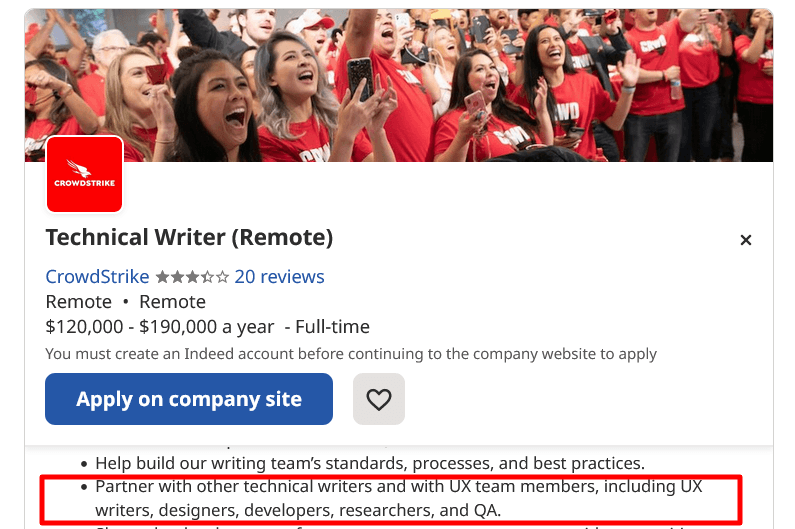
Source: Indeed
As you can see above, CrowdStrike wants its technical writers to be comfortable with collaborating not only with other writers but also with people from other departments.
If you’re skeptical about how serious they are, here’s a more directly formulated requirement from the same job listing:

Source: Indeed
If you look at other job listings, the situation is similar.
But why exactly is conversational intelligence so important for technical writers?
One of the reasons lies in the fact that the research phase is essential before the actual writing of the documentation—and interviewing subject matter experts (SMEs) is a big part of it.
A technical writer who’s a good communicator knows how to ask the right questions and get the information they need from the expert.
Luckily, interviewing is something you can practice. Here’s some advice from TechWhirl’s Connie Giordano, one of their technical writing experts.
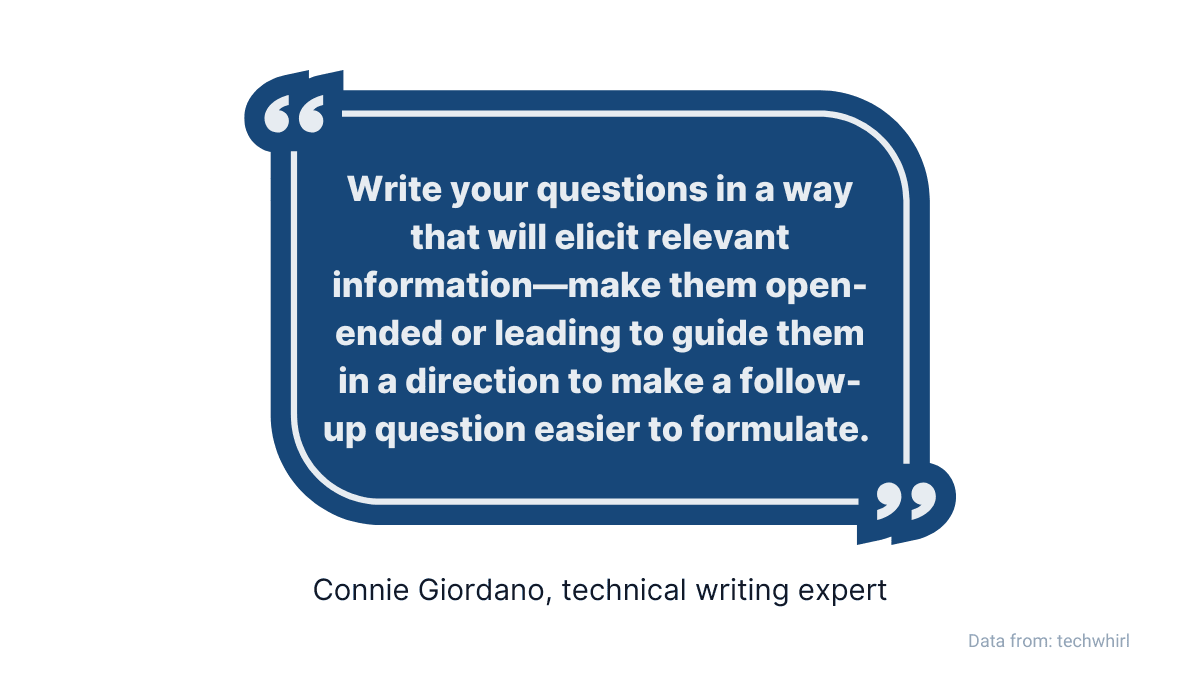
Source: Archbee
Although not everyone is a natural communicator, following advice like that can increase your chances of getting valuable answers from SMEs.
Also, while you’re interviewing an expert, you should remember to listen—and to show that you’re listening, as Phil McKinney, former Vice President of Hewlett-Packard, advises:
“People can hear you’re listening.”
That means you should practice subtle listening signs like nodding and be aware of your body language.
You shouldn’t overlook its importance as it comprises 55% of overall communication.
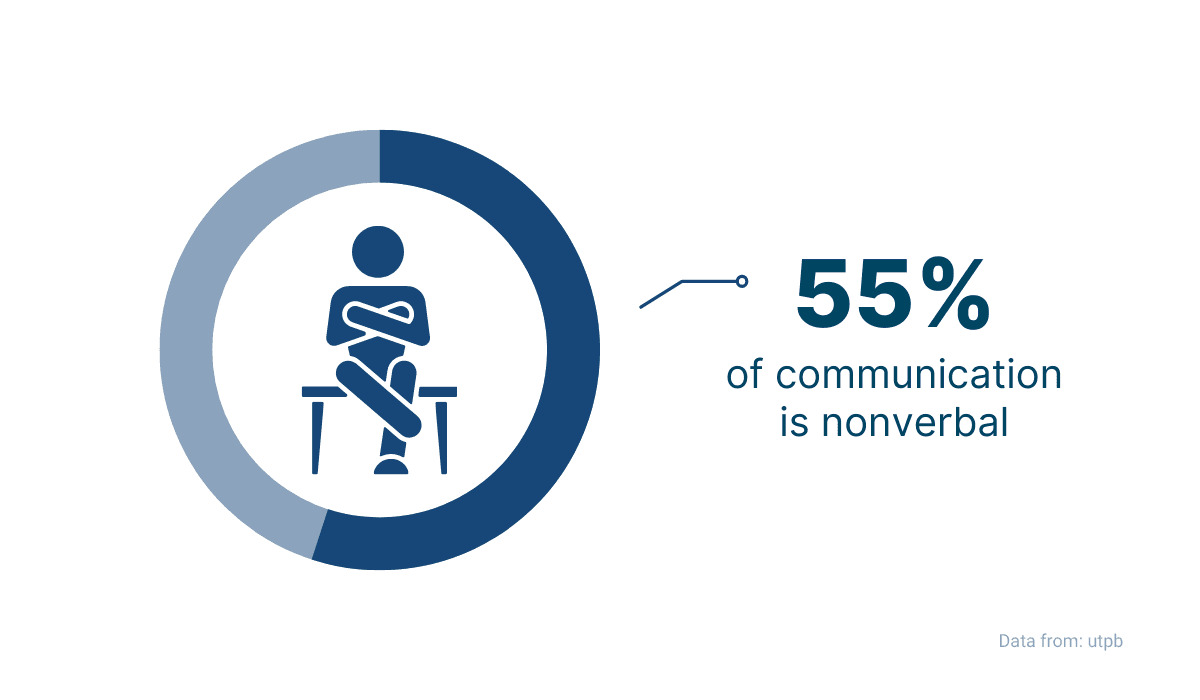
Source: Archbee
Of course, that goes both ways. A part of active listening skills is the ability to observe and interpret the nonverbal communication signals from the other person.
For example, take a look at the emotional cues that researchers Eva de Lera and Muriel Garreta-Domingo identified.
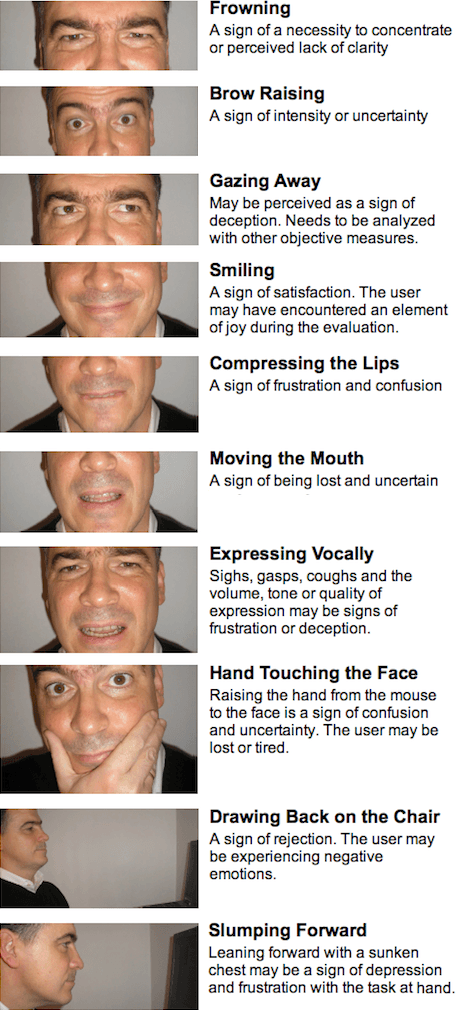
Source: uxmatters
Paying attention to signals like those can help you guide the conversation in your desired direction.
To sum up, communication skills are fundamental. They have many moving parts, but it’s worth not neglecting them.
Curiosity
As a technical writer, you can work in many different industries, from medicine and the military to IT, transportation, and everything in between.
That’s why curiosity is one of the most important soft skills you can develop.
Why? Because one writer can’t have the same passion and interest for every area and every topic.
Someone enjoys creating detailed and intriguing white papers like the one from Uber.

Source: Uber
Another person thrives on writing helpful refrigerator manuals. What someone finds interesting is highly subjective.
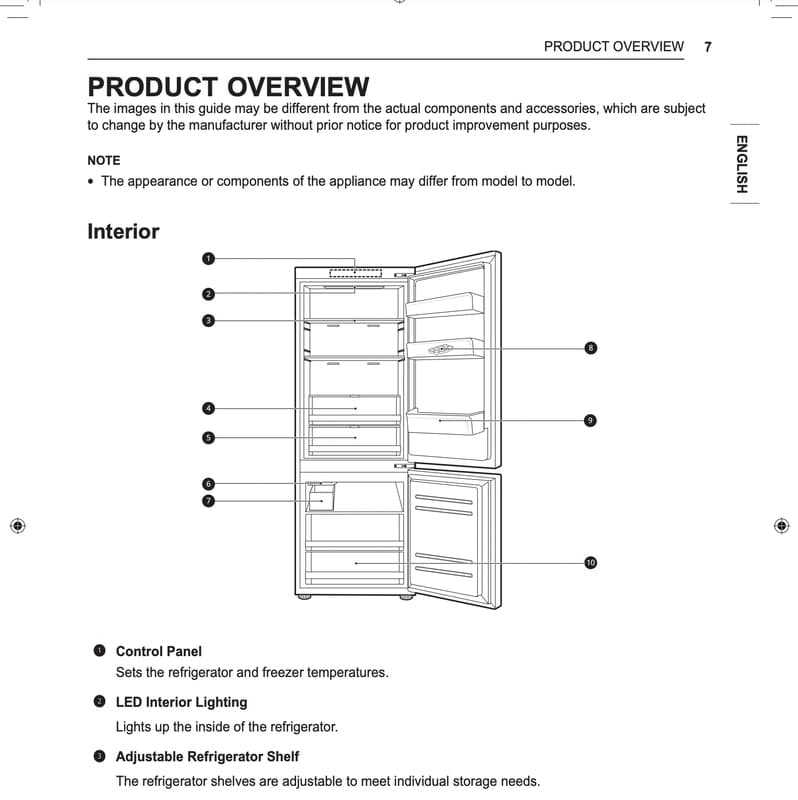
Source: gathercontent
The key is being curious so you can make excellent technical documentation even if the topic isn’t particularly exciting to you.
Curiosity is, then, not only an advantage but also a requirement for success as a technical writer, in the words of Kathy Wiemers, an experienced technical writer herself.
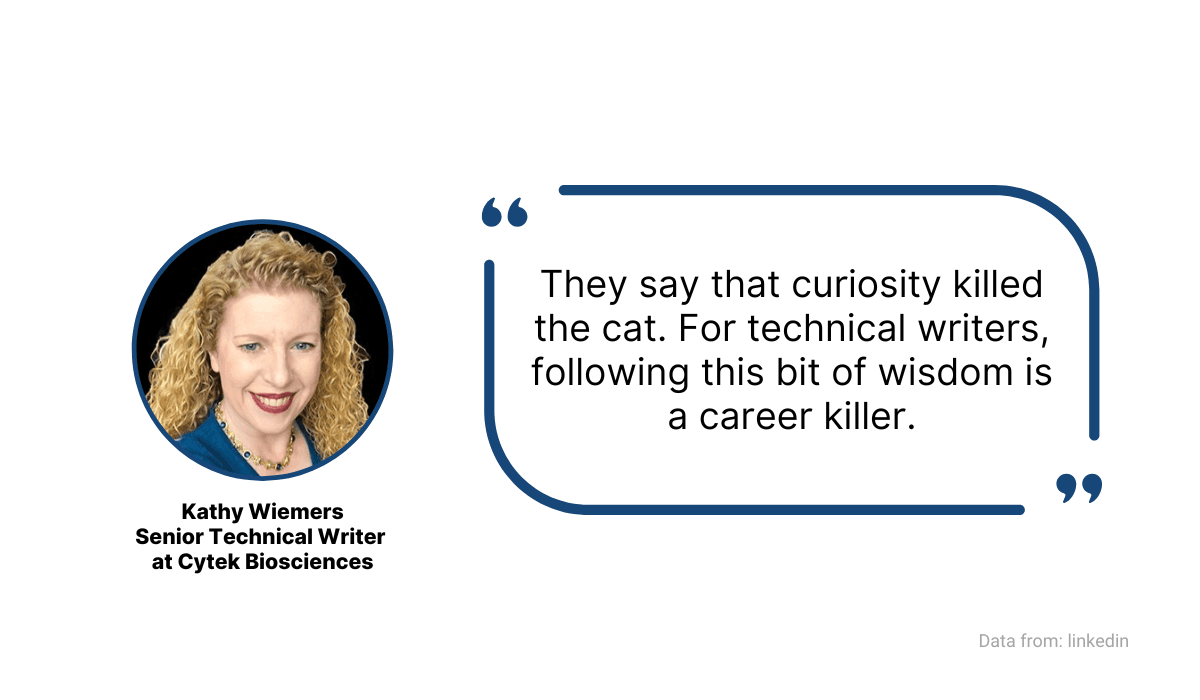
Source: Archbee
How is curiosity so crucial?
As she explains, curious technical writers ask questions about anything. Curiosity encourages them to learn and collect information that makes their writing useful to the audience.
The key thing when it comes to technical writers’ knowledge about a particular topic is that they have more of it than their audience.
If they aren’t curious enough to invest time and effort into learning, something like this can happen:
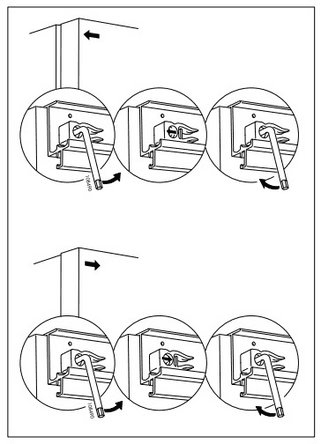
Source: knowledgeowl
You’re looking at a page from an IKEA manual for one of their sliding doors.
As you can probably tell, it isn’t very clear, to say the least.
The only difference between the two diagrams is the little arrow on the top, and it’s not clear what it represents and why a customer should follow the instructions.
An approach marked by curiosity when you create technical documentation can prevent situations like that—a curious writer gets to the bottom of complex concepts and presents them clearly to the users.
Another important reason you should be curious is to avoid burnout.
As technical writer Bradley Nice explains, it’s fine if some assignments feel dull, but if you’re bored and annoyed most of the time, that’s a cause for concern.
Tom Johnson from the I’d Rather Be Writing blog has a way of preventing burnout:
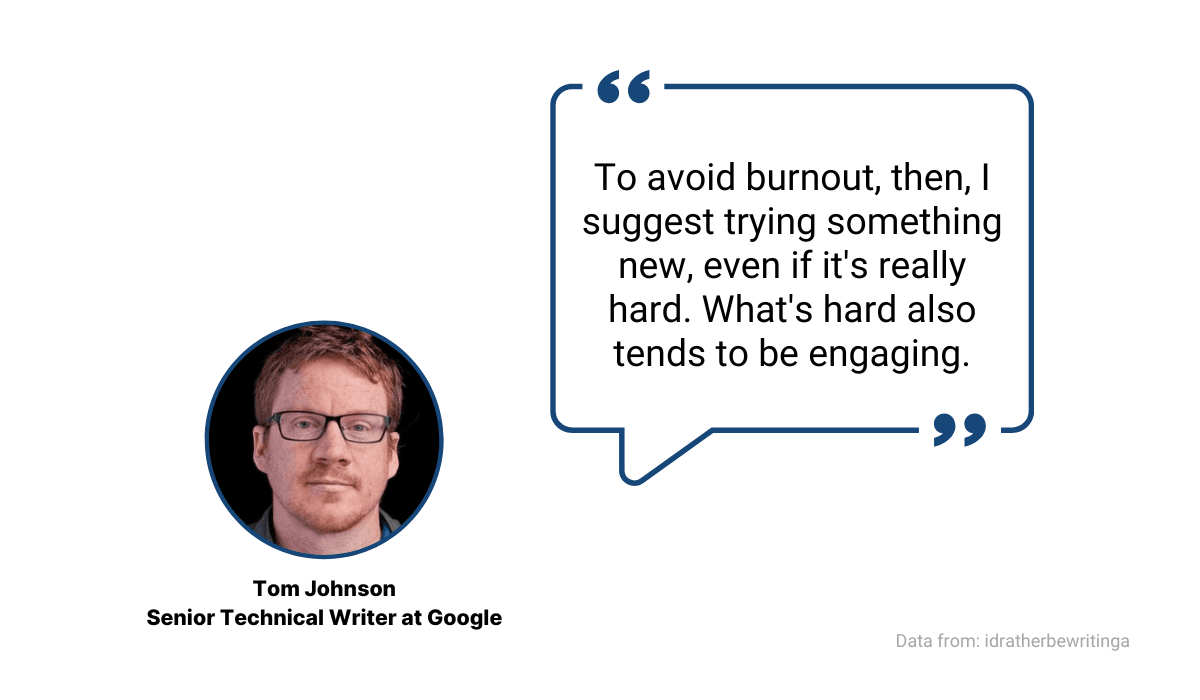
Source: Archbee
As he points out, trying out new things as a writer can keep you engaged, and trying out new things also means developing your curiosity.
Therefore, curiosity isn’t only important for producing great technical documentation—it also plays a considerable part in the writers’ satisfaction with their jobs.
Empathy
When a technical writer creates a document, that text has a purpose—usually, that purpose is to convey information that can educate or make someone’s life easier.
As you probably know, empathy is an ability to understand someone’s feelings, put yourself in their shoes, and see things from their point of view—there are many definitions of empathy, but almost all boil down to that.
When it comes to writing, an empathetic technical writer is aware that his audience doesn’t know as much as he or she and that they read to learn or fix some problem.
As Suyog Ketkar, an experienced technical writer and Content Designer at IBM, points out that awareness contributes to the quality of writing.

Source: Archbee
If you’re wondering how apparent empathy, or lack of it, can be in technical writing, let’s see one example.
Below is a passage from the DITA 1.2 specification. DITA stands for Darwin Information Typing Architecture, and if you look at it, it’s apparent that there’s a certain knowledge required from the user to understand it.

Source: Reddit
As the Reddit user who found this example explained, that’s what it looks like when a writer doesn’t know how to communicate with the audience—in other words, this writing lacks empathy, and it’s no longer useful for anyone except for those readers who are already well versed in DITA.
When you see the “translation” of that passage, that’s even more clear:

Source: Reddit
However, the importance of empathy extends further than users, even if the writing in question is support documentation.
Plamena Maleva, Chief of Staff at Bots & People, spoke about an empathetic approach to writing, which she illustrated with an empathy triangle.
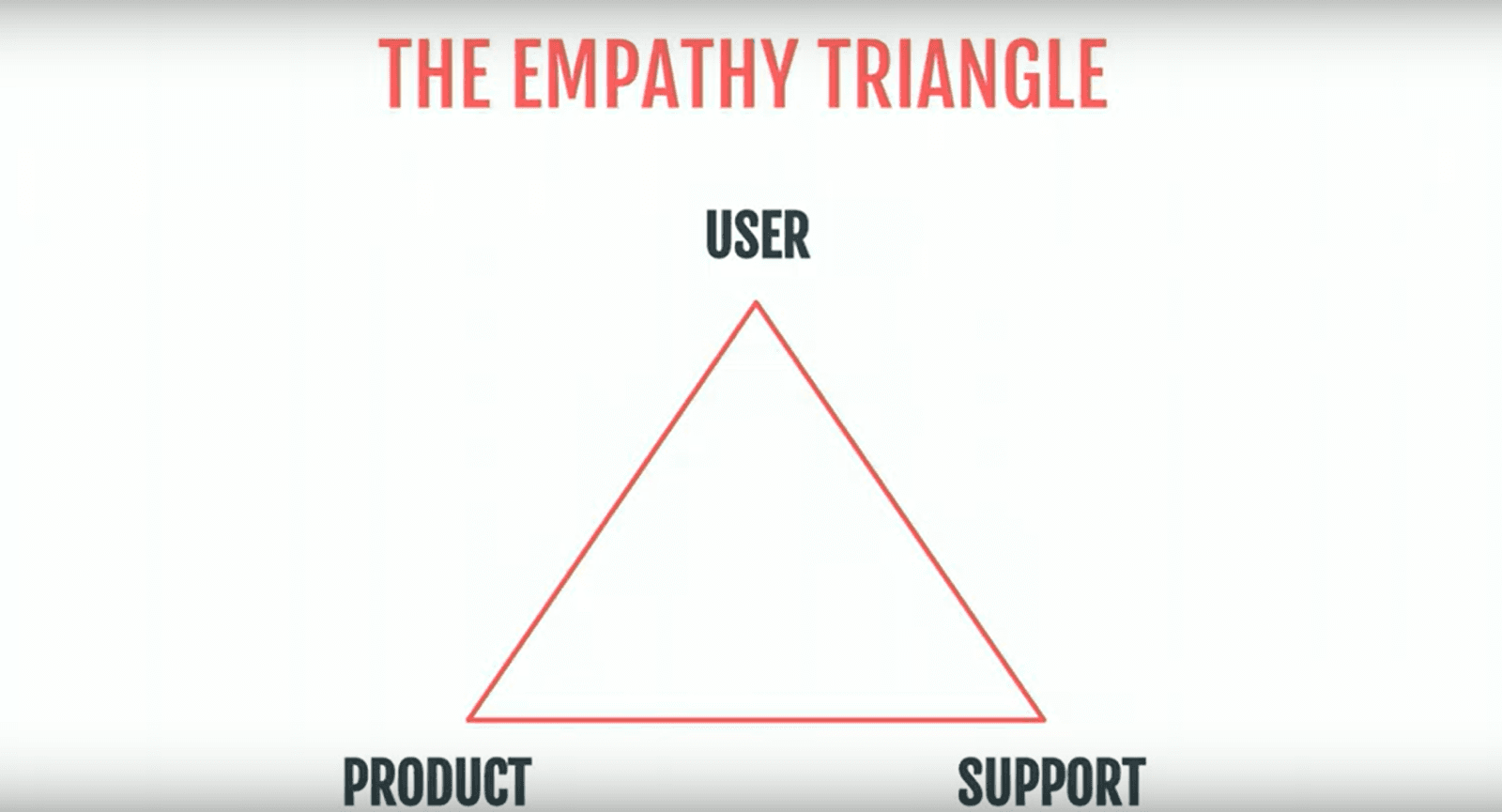
Source: Write the Docs on YouTube
That approach proposes that when you write, you need to tailor your writing to your users’ requirements, what the product team can deliver, and to you and your team of writers.
Why? Because, as she explains, it helps you tailor your writing to the entire support process instead of just the one use case you’re writing about.
Therefore, the empathy you have while writing technical documentation can steer your content in a certain direction.
It’s a soft skill that can differentiate helpful writing from the kind only the writer understands—which can be crucial.
Concentration
To create a high-quality technical document, you need a lot of concentration. Technical writing needs to be clear and accurate, and you can accomplish that only by focusing on your task.
It’s logical if you think about it.
The whole process of creating a technical document, from the research to self-editing, requires skills like comprehension, retention, interviewing, and, of course, writing, to name just a few.
That amounts to a complex process, and to be successful at it, a writer should have a laser-like focus.
For that, it’s helpful to divide work into smaller time periods with brief rests in between. In general, most advice says it’s possible to focus on one task for about an hour.
However, some writers like Tessa Palmer also use the Pomodoro technique to organize their writing process:
- work for 25 minutes
- rest for 5 minutes
- repeat four times, take a 20-minute break
As she says, 25 minutes is a great interval to write with complete focus on the task. For example, she can write the first draft of a text in one interval and edit it in the next.
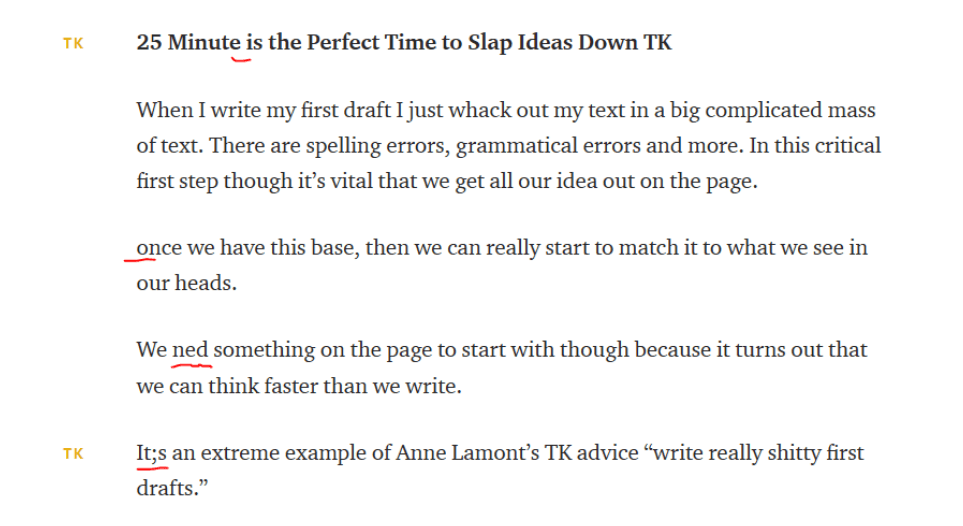
Source: Medium
You don’t need special tools besides a stopwatch, but there are some helpful Pomodoro timers available.
For example, Pomodoro Tracker for Slack is convenient because it’s a Slack app, so it automatically updates your status and no one can disturb you during your work intervals.
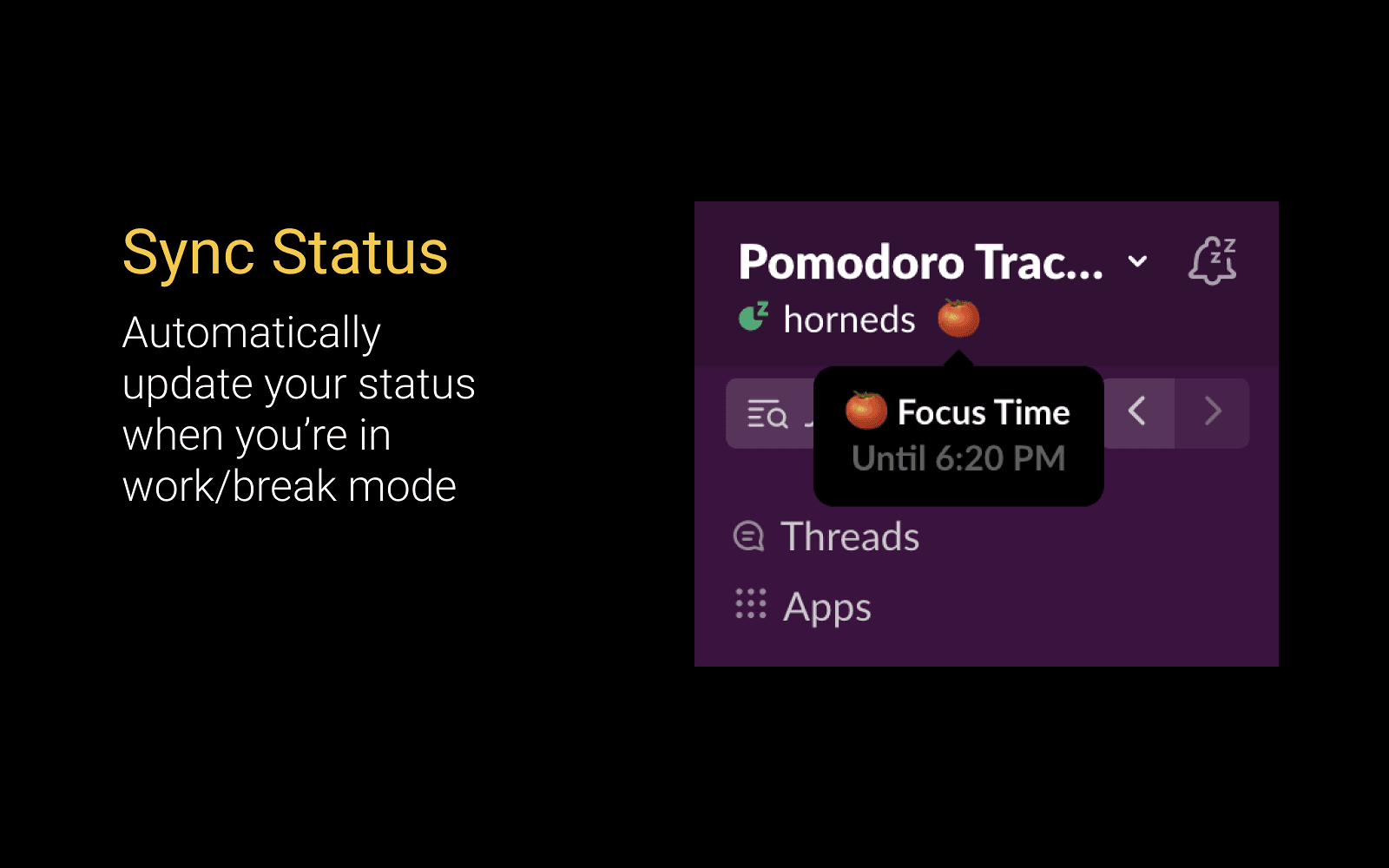
Source: Slack
That ties in into another crucial element of maintaining concentration—you shouldn’t be disturbed while you work.
Interruption can cause time-wasting and difficulties when resuming your task.
According to Gloria Mark from the University of California, it takes over 23 minutes to continue the interrupted work.
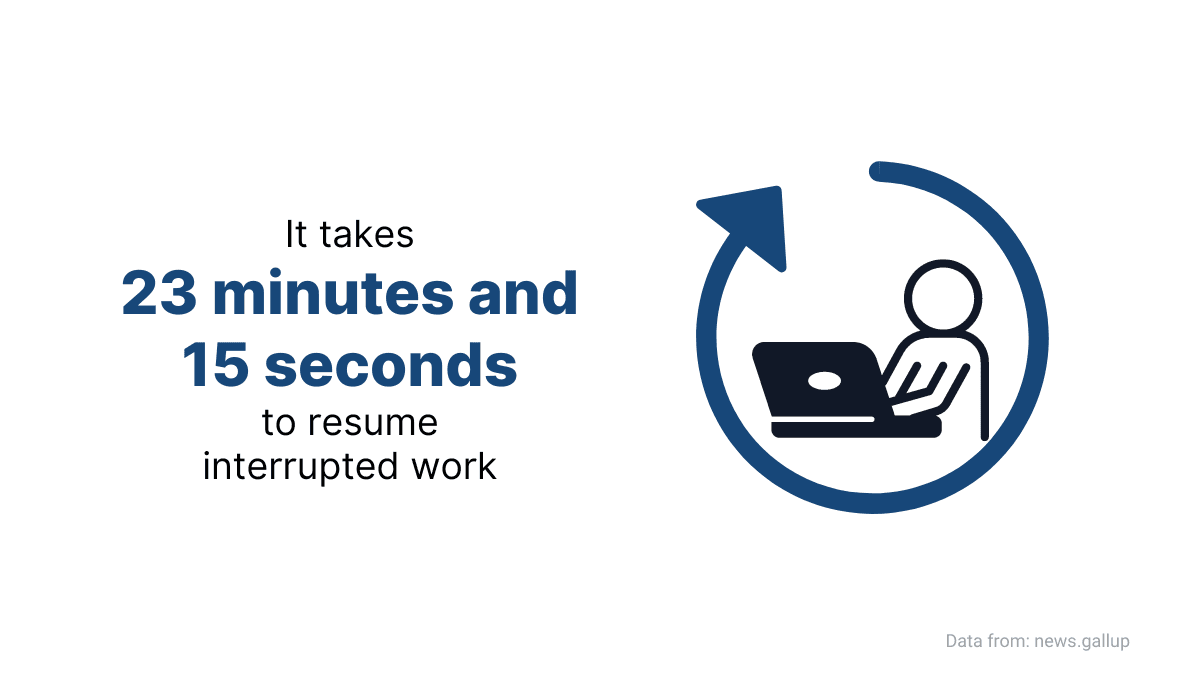
Source: Archbee
Furthermore, often you don’t even get back to the original task. As Mark explains, there are, on average, two intervening tasks before that, so it takes even longer to resume your work.
Although it’s not always possible to cut out all distractions, you can take some measures to preserve your concentration.
For example, you can use tools like FocusMe, which block specific websites or apps.
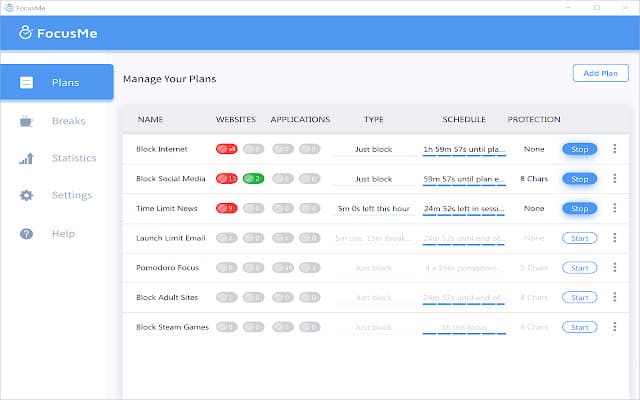
Source: chrome.google
It’s very customizable and, therefore, great for technical writers.
For instance, you can allow certain websites you need for research and block the rest.
Also, you can partially block sites so you can, let’s say, disable access to Facebook, but keep using Messenger if you need it.
Creating an environment suitable for concentration can significantly improve it. If you manage to do that, you’ll see the benefits in your productivity.
Adaptability
You’ll be hard-pressed to find a technical writer who doesn’t interact with technology on a daily basis.
Whether they use writing and publishing software or work in an industry like software development that revolves around technology, they need to possess enough adaptability to keep up with the changes.
Otherwise, a combination of low adaptability and fast-changing technology can quickly make their knowledge obsolete.
Employers are also aware of that.
For instance, below, you can see a job listing for a technical writing position that emphasizes knowledge of some relevant technologies and, more importantly, the ability to learn.
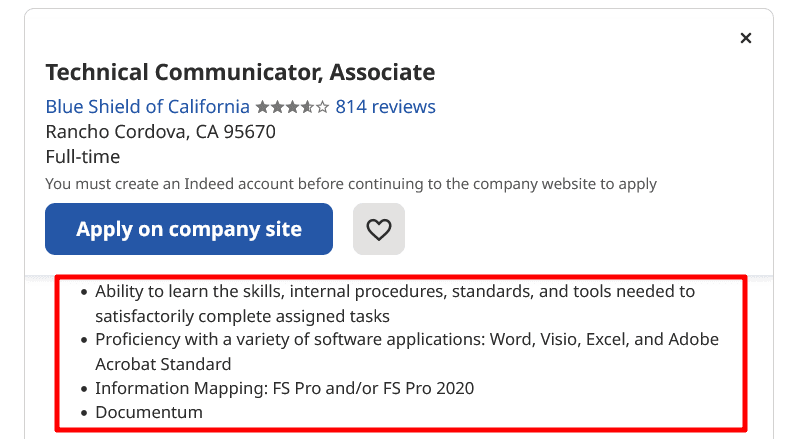
Source: Indeed
In other words, your knowledge should already be up to date, and you need to be flexible so you can learn more.
That way, you can have more opportunities in emerging technologies.
For instance, Augmented Reality (AR) has been around for some time, but it’s increasingly present in technical documentation.
For example, various industries use AR applications for visualizing maintenance documentation.
At Siemens, technical writers develop it for maintenance procedures, manufacturing work instructions, and similar specific procedures, like the engine maintenance you can see below.

Source: blog.sw.siemens
Adaptability is beneficial for technical writers when it comes to advanced technology like that. Adaptable writers can quickly learn it and make themselves indispensable to their organization.
Besides that, this soft skill is also beneficial for the process of writing. What do we mean by that?
Today, technical writers have many useful tools at their disposal that allow them to be more productive and produce documentation of a higher quality.
Archbee is one of those tools. It’s an online documentation platform packed with useful features for writers and their teams.
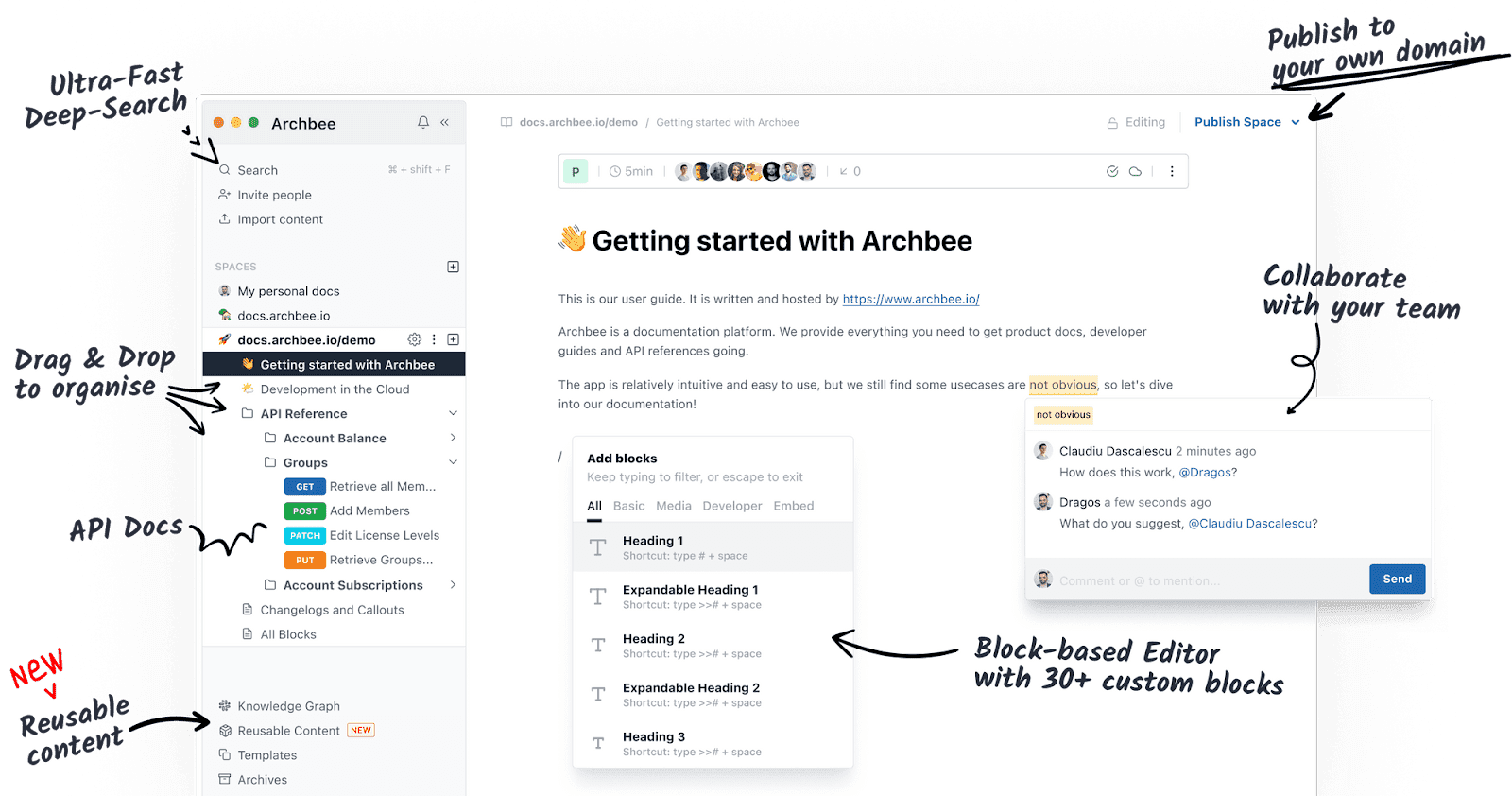
Source: Archbee
With Archbee, writers can create, edit, publish, and maintain documentation—all in one place.
The writing is easier with a block-based editor and templates that save time.
Also, collaboration with other team members is simple. Anyone with permission can highlight document parts, leave comments, and tag people in them.

Source: Archbee
In short, adaptable writers keep up with tools like Archbee, which makes them better at their jobs.
It’s a soft skill worth developing.
Confidence
While discussing valuable soft skills for technical writers, one shouldn’t go under the radar because it can facilitate many good practices and habits—and that’s confidence.
Confidence doesn’t mean a writer should believe that they’re the best in the business and the others should revel in their abilities.
On the contrary, while it’s good to trust your skills, being a confident writer also means accepting feedback and being grounded enough to recognize where you can improve.
Those are good practices and habits we mentioned in the first sentence of this section. Confident writers will ask for feedback and use it to their advantage, even if it’s not favorable.
According to data from Zippia, 75% of employees find feedback valuable, and a confident writer should share that attitude.
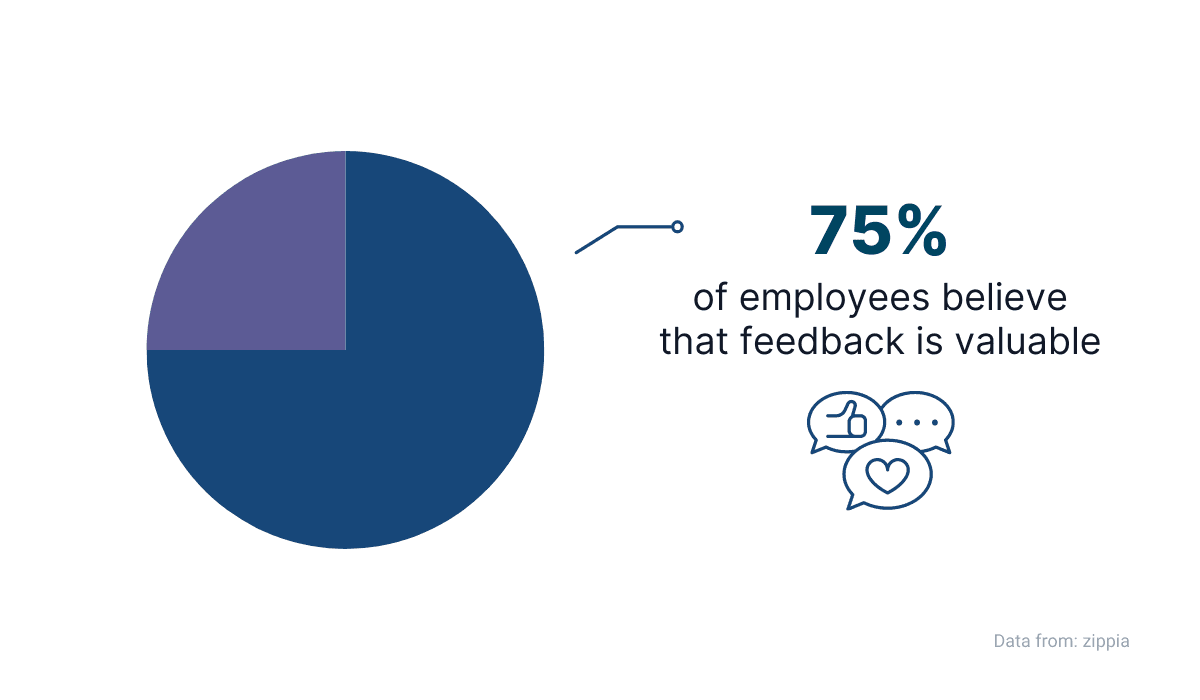
Source: Archbee
That’s because feedback can point to the weaker sides of technical writers’ abilities, which they can then work on and improve.
And the benefit of improved knowledge and skills will be—increased confidence. So, confidence is valuable for the process of improvement, which in turn benefits confidence itself.
But how can you improve your technical writing skills? One approach is to practice. Here’s how Laura Hyatt, a Solutions Architect at Amazon Web Services, does that:
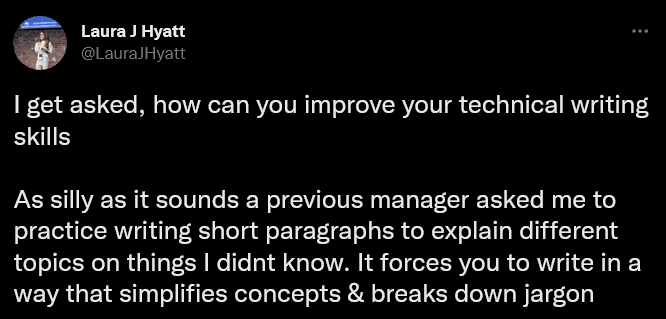
Source: Twitter
As you can see, it’s a simple concept that can improve your skill of breaking down complex concepts into plain and clear language—a crucial skill for technical writers.
If you want a more guided approach to improving your skills, why not try a course?
There are many available online, one of which is a technical writing course by Google.
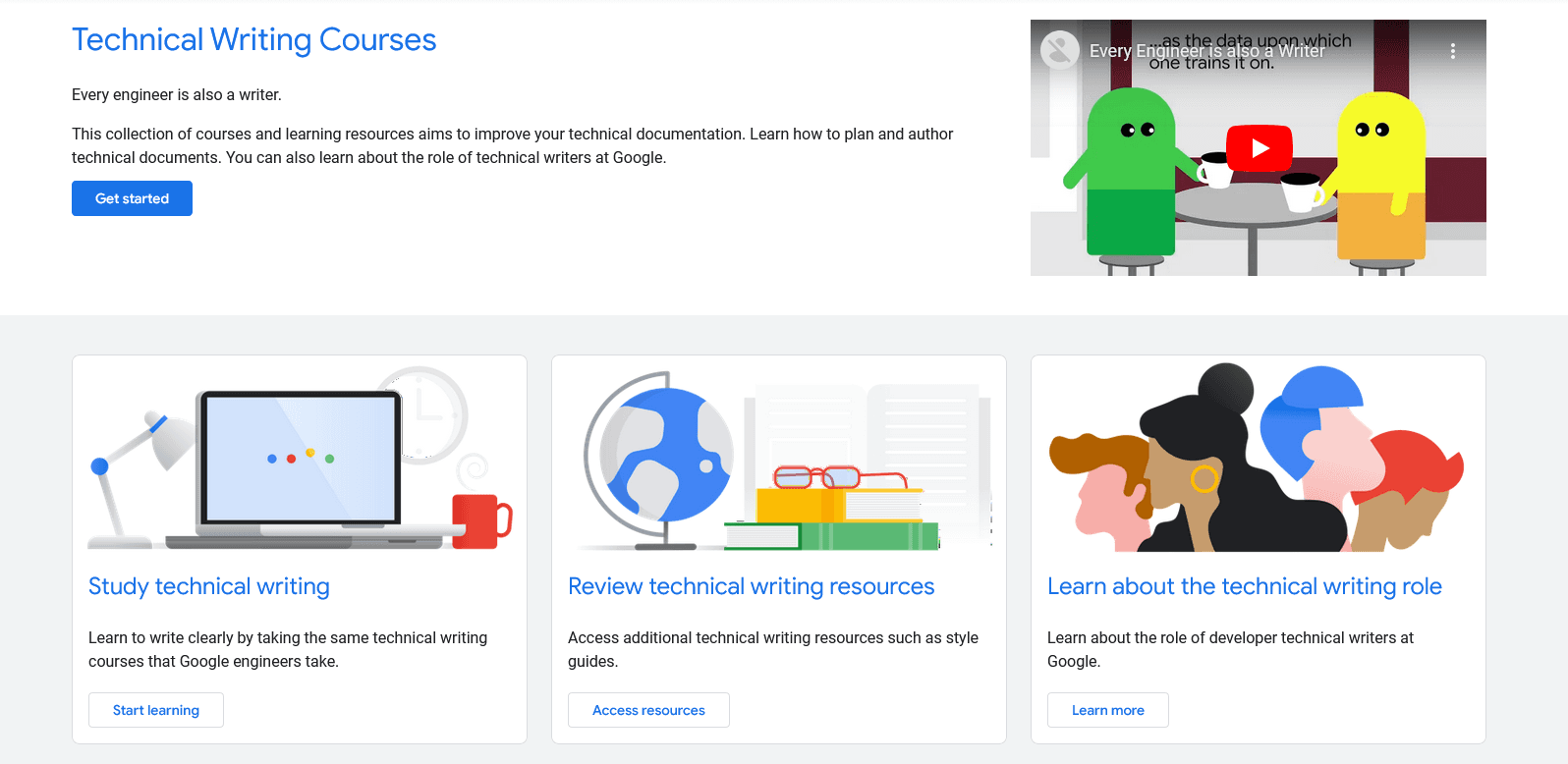
Source: developers.google
Although it’s primarily designed for software engineers who want to improve their technical writing skills, it’s most likely valuable for anyone—the basic principles of technical writing are the same, regardless of your previous experience.
To sum up, confidence in technical writing is relatively easy to improve—accepting feedback and working on improving your skills can boost it significantly.
The challenging part can be recognizing the opportunities to do so.
Conclusion
There’s no denying that a technical writer should have excellent writing, researching, editing, and technical skills to do their job at the highest level.
However, achieving the best results may be too challenging if they lack soft skills.
Combining hard skills with soft skills like conversational intelligence, curiosity, empathy, concentration, adaptability, and confidence makes a winning combination.
With that, a technical writer can create top-tier technical documentation.
Frequently Asked Questions
Conversational intelligence. Great docs start with great conversations.
It’s the ability to ask clear questions, listen actively, read nonverbal cues, and collaborate smoothly with SMEs and cross‑functional teams. Strong conversational skills help you extract accurate details, resolve ambiguities early, and align stakeholders.
Practical ways to build it:
- Prepare SME interviews with clear goals and a prioritized question list, and share context in advance.
- Ask open, simple questions; follow up on unclear points; avoid assumptions.
- Practice active listening: summarize what you heard, confirm next steps, and capture action items.
- Pay attention to nonverbal signals and your own body language to keep discussions productive.
- Maintain a decision log that records sources, tradeoffs, and agreed terminology so everyone stays aligned.
